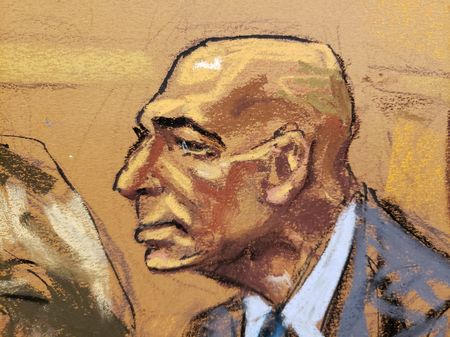By Luc Cohen
NEW YORK (Reuters) -Prosecutors charging onetime Donald Trump fundraiser Tom Barrack with being an illegal foreign agent can ask him about his comments on the killing of Saudi journalist Jamal Khashoggi and efforts to build nuclear power plants in the Middle East, the judge overseeing Barrack’s trial said on Wednesday.
The ruling by U.S. District Judge Brian Cogan came on the third day of Barrack’s testimony in his own defense in Brooklyn federal court. He faces charges of pushing the United Arab Emirates’ interests to the former president’s administration without notifying the U.S. Attorney General, as required by law. Cross-examination is expected to begin on Thursday.
Barrack, 75, has pleaded not guilty. He has said his interactions with Middle Eastern officials were part of his role running private equity firm Colony Capital, now known as DigitalBridge Group Inc, and that even when his interests aligned with the UAE’s he was acting on his own.
Cogan did not state in open court what Barrack said about Khashoggi, a Saudi insider-turned-critic who was murdered and dismembered inside the kingdom’s consulate in Istanbul in an operation U.S. intelligence says was approved by Crown Prince Mohammed bin Salman, the de facto ruler.
In 2019, Barrack said at a conference in Abu Dhabi that “atrocities in America are equal or worse” than the killing of Khashoggi, news outlets reported at the time. Barrack later apologized for the comments, calling the killing “atrocious.”
The prince has denied ordering the killing but acknowledged it took place “under my watch”.
While Barrack is not charged with acting as a Saudi agent, the country and the UAE are close allies.
Cogan also said he would let prosecutors ask Barrack about a plan he pushed in the early days of the Trump administration to construct 40 nuclear plants in Saudi Arabia and elsewhere in the Middle East. A Democratic-led Congressional report in 2019 found that Barrack sought to profit from the deal even as he pushed to be named to a diplomatic post.
Barrack is not charged with any crimes over the civil nuclear plan, which fell through. But Cogan said the defense opened the door for prosecutors to ask about it by displaying communications involving Barrack and the co-founder of IP3, the consortium of firms pushing plan.
ENERGY SPEECH
Earlier on Wednesday, Barrack testified that former Trump campaign chairman Paul Manafort asked him to solicit input from Middle Eastern officials on a speech the candidate was to deliver on energy policy in 2016. One of prosecutors’ major charges is that Emirati officials provided input to Barrack on what Trump should say in the speech.
Barrack’s assertion that it was not his idea to seek out Emirati input on the speech could bolster his defense that while he long sought to improve ties between the United States and several Middle Eastern countries, he never acted at Abu Dhabi’s direction or under its control – which prosecutors must prove to show he was an agent.
A lawyer for Manafort, who is not accused of wrongdoing in the case, declined to comment.
Barrack – who was not on the campaign, though he later chaired Trump’s inauguration – said he sent a draft of the speech to an energy executive in the Emirates as well as Rashid Al-Malik, a businessman who prosecutors have charged with acting as an intermediary between Barrack and UAE officials. Al-Malik is at large.
But he said he ultimately did not include the feedback that Al-Malik sent him from a UAE official in the draft.
(Reporting by Luc Cohen in New York; editing by Jonathan Oatis and David Gregorio)





